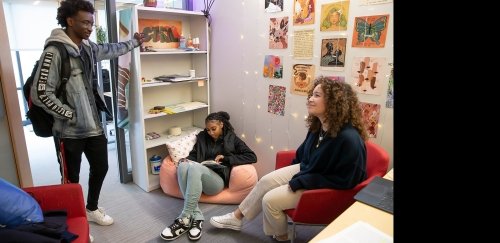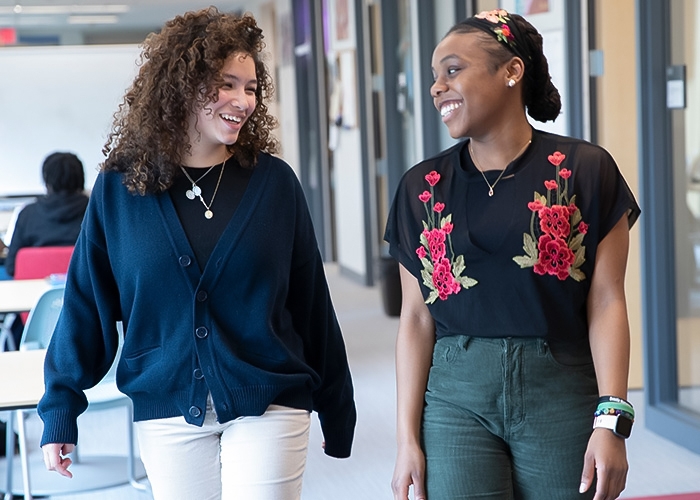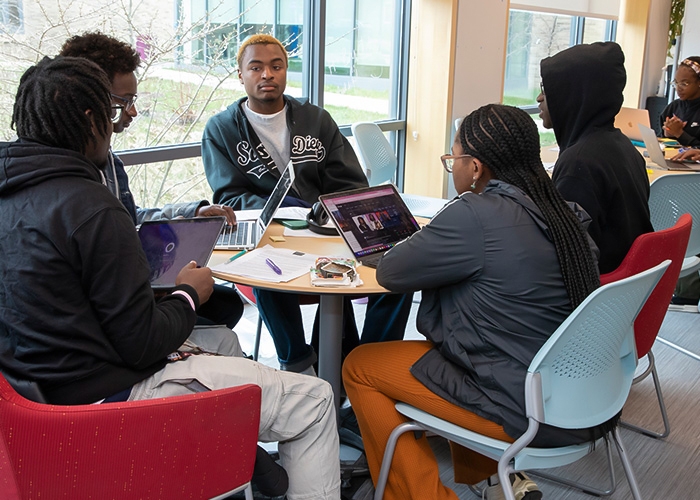Once She Was a Student in Need of Services, Now She Provides Them for Others
- News & Events
- News
- Once She Was a Student in Need of Services, Now She Provides Them for Others

The Office of Student Support Services at RIC helps all students excel as they reach that most important milestone – graduation.
Almost right after I started my first year at Rhode Island College, the COVID-19 pandemic hit. I was a first-generation college student and a member of RIC’s Preparatory Enrollment\Program (PEP). I didn’t feel connected to the college because classes had moved online. I also lacked the confidence to enroll in any of the student organizations or programs on campus.
During the lockdown, my PEP advisor, Mackenzie Williams, reached out to me to let me know that Student Support Services (SSS) – a federally funded program for low-income, first-generation students and students with a documented disability – was accepting new applicants. SSS provides support, such as counseling, financial aid assistance, tutoring, professional development, scholarships and more, to help students feel confident in their ability as scholars.

By my senior year, I finally felt a strong connection to the college. During that year, I was required to complete an internship as part of my youth development major. SSS helped me find that internship opportunity. One of the advisors thought I would be a great match for CREAR Futuros (College Readiness, Achievement and Retention), a program created by the Hispanic Federation to help more Latinos earn a college degree.
At CREAR Futuros, which is located in the SSS office, I became a mentor for other students. I connected them to various resources on campus and recommended that they access SSS whenever they needed help.
During that internship, I realized how much I enjoyed working with first-generation college students. I realized that this is what I wanted to do as a career.
As a first gen, you can feel like you don’t have the support you need outside of class. Most first gens work part-time or even full-time jobs while balancing school. In my senior year, I was working a 20-hours-a-week internship, another 20-hours-a-week part-time job and taking classes.
In my senior year, SSS advisors helped me explore my options for grad school. They explained to me the requirements to be accepted into the M.A. in youth development program at RIC and who I needed to reach out to. They reviewed my application essay and made appropriate suggestions for how to improve my writing. I am now in my first year of the master’s program at RIC.
After graduation, SSS was key in helping me find a job in my field. One day, Mackenzie let me know that an SSS advisor position had opened up. I applied and started working in August 2022. I am now doing what I dreamed of when I interned for CREAR Futuros – helping first-generation college students excel.
When I started working at SSS, I was afraid that I might not qualify for the job, but soon enough my co-workers helped me realize how much I bring to the organization by helping students in the same way I had been helped.
Destiny Zepeda ’22
Now, as an advisor, I meet SSS students three times a semester – I have a beginning, middle and end-of-semester check-in with them – to see how they are doing not only in their classes but in their interpersonal relationships within the RIC community. If a student is having difficulty with a class or an assignment, I connect them to tutors. I help them select classes, create a study schedule, get connected with other organizations on campus and even discuss their personal lives outside of school if they need to.
SSS also helps students develop professional skills by holding – during Fall and Spring Semester – activities like Community Wednesday. At this event, we bring in professionals who talk about their real-world experiences on the job and teach students how to market themselves in the professional world. Our students are not only able to network at these events, they gain new skills.
In terms of building a sense of community, the SSS office offers a very comfortable common space for students to hang out, talk to friends, play cards or do homework.

SSS also offers scholarships to first- and second-year students. If eligible, they can receive up to $1,000. If an SSS student is struggling with tuition, we can help them look for scholarships outside of our program.
As an advisor, I meet with students who are having a wide range of concerns. Not too long ago, I met with a student who was struggling with mental health issues. As a first gen, this student feared failing and disappointing their parents and family. We were able to help by connecting the student to RIC’s Counseling Center and to the CARE team, which aims to promote student well-being and success while prioritizing the safety of students in the RIC community. We also got in touch with the student’s professors to let them know that the student was experiencing life challenges.
On another occasion, I helped a student plan out their schedule for the school year and find tutors who could help them improve their study habits. I also gave them some suggestions for getting more involved on campus. I recommended Harambee – RIC’s Black student organization. Now the student is part of Harambee’s executive board.
If an SSS student is struggling with tuition, we can help them look for scholarships.
Destiny Zepeda ’22
What’s great about SSS is that we have an open-door policy. If you have a question – even if you’re not an SSS member – we try to answer it. In some cases, we may require that you schedule an appointment, but we’re always here for anyone in the RIC community. I like to say that it’s the students who make this organization what it is.
Looking back from when I first became an SSS member until today, I can see how much I’ve accomplished over the years.
As a student, I was particularly shy and lacked the confidence to speak up and even believe in myself. When I started working at SSS, I was afraid that I might not qualify for the job, but soon enough my co-workers helped me realize – because that’s how compassionate everyone is here – how much I bring to the organization by helping students in the same way I had been helped. I’m sure someday other students will feel the same way I feel about Student Support Services at Rhode Island College.
HOW DO STUDENTS BECOME ELIGIBLE FOR STUDENT SUPPORT SERVICES (SSS)?
To be an eligible SSS student, you need to be enrolled at RIC and be a U.S. citizen or permanent resident. You also have to meet at least one of the following criteria:
• Be a first-generation college student (which means that neither your parents or guardian has a bachelor's degree).
• Meet the Federal TRIO Program low-income levels (which means that your family's taxable income for the previous year didn’t exceed 150 percent of the poverty-level amount).
• Have a documented disability (this means that a qualified medical professional diagnosed you with a physical or mental impairment that substantially limits one or more of your major life activities).
